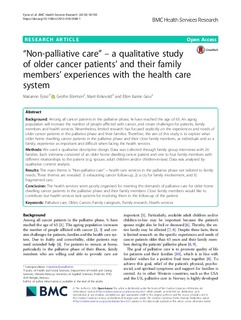| dc.contributor.author | Fjose, Marianne | |
| dc.contributor.author | Eilertsen, Grethe | |
| dc.contributor.author | Kirkevold, Marit | |
| dc.contributor.author | Grov, Ellen Karine | |
| dc.date.accessioned | 2018-11-01T09:31:43Z | |
| dc.date.available | 2018-11-01T09:31:43Z | |
| dc.date.created | 2018-10-23T13:42:53Z | |
| dc.date.issued | 2018 | |
| dc.identifier.citation | BMC Health Services Research. 2018, 18 (745), 1-12. | nb_NO |
| dc.identifier.issn | 1472-6963 | |
| dc.identifier.uri | http://hdl.handle.net/11250/2570541 | |
| dc.description | This article is distributed under the terms of the Creative Commons Attribution 4.0 International License, which permits unrestricted use, distribution, and reproduction in any medium, provided you give appropriate credit to the original author(s) and the source, provide a link to the Creative Commons license, and indicate if changes were made. | nb_NO |
| dc.description.abstract | Background:
Among all cancer patients in the palliative phase, ¾ have reached the age of 65. An aging population will increase the number of people afflicted with cancer, and create challenges for patients, family members and health services. Nevertheless, limited research has focused explicitly on the experiences and needs of older cancer patients in the palliative phase and their families. Therefore, the aim of this study is to explore what older home dwelling cancer patients in the palliative phase and their close family members, as individuals and as a family, experience as important and difficult when facing the health services.
Methods:
We used a qualitative descriptive design. Data was collected through family group interviews with 26 families. Each interview consisted of an older home dwelling cancer patient and one to four family members with different relationships to the patient (e.g. spouse, adult children and/or children-in-law). Data was analysed by qualitative content analysis.
Results:
The main theme is “Non-palliative care” – health care services in the palliative phase not tailored to family needs. Three themes are revealed: 1) exhausting cancer follow-up, 2) a cry for family involvement, and 3) fragmented care.
Conclusion:
The health services seem poorly organised for meeting the demands of palliative care for older home dwelling cancer patients in the palliative phase and their family members. Close family members would like to contribute but health services lack systems for involving them in the follow-up of the patient. | nb_NO |
| dc.description.sponsorship | This project was funded by a research career grant to Marianne Fjose (Grant No. 2010/754–5806/2010), Western Norway University of Applied Sciences, Faculty of Health and Social Sciences, Department of Health and Caring Sciences, Førde, Norway, previously Sogn and Fjordane University College, Faculty of Health Studies, Førde, Norway. | nb_NO |
| dc.language.iso | eng | nb_NO |
| dc.rights | Navngivelse 4.0 Internasjonal | * |
| dc.rights.uri | http://creativecommons.org/licenses/by/4.0/deed.no | * |
| dc.title | “Non-palliative care” – a qualitative study of older cancer patients’ and their family members’ experiences with the health care system | nb_NO |
| dc.title.alternative | “Non-palliative care” – a qualitative study of older cancer patients’ and their family members’ experiences with the health care system | nb_NO |
| dc.type | Journal article | nb_NO |
| dc.type | Peer reviewed | nb_NO |
| dc.description.version | publishedVersion | nb_NO |
| dc.rights.holder | © The Author(s). 2018 | nb_NO |
| dc.source.pagenumber | 1-12 | nb_NO |
| dc.source.volume | 18 | nb_NO |
| dc.source.journal | BMC Health Services Research | nb_NO |
| dc.source.issue | 745 | nb_NO |
| dc.identifier.doi | 10.1186/s12913-018-3548-1 | |
| dc.identifier.cristin | 1622695 | |
| cristin.unitcode | 222,56,0,0 | |
| cristin.unitname | Fakultet for helse- og sosialvitenskap | |
| cristin.ispublished | true | |
| cristin.fulltext | original | |
| cristin.qualitycode | 2 | |

